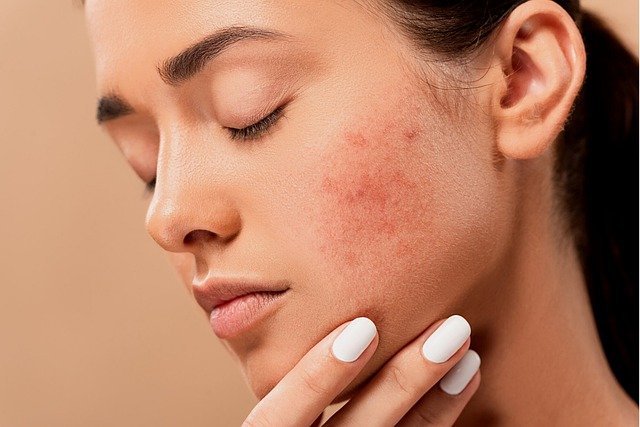Isn’t it ironic that even if we’re staying more at home during the COVID-19 pandemic, some of us are getting more skin problems? If the new normal is starting to take a toll on your skin, your usual skincare routine may no longer work this time.
We are in the middle of a disrupted world, and adapting to the new daily routine will require a different skincare strategy. In this post, we will discuss the causes of skin problems during the pandemic and how you can avoid them.
The impact of quarantine and new routines that affects your skin
Our skin reflects our health and what is happening inside our bodies. Our skin problems are usually due to our health condition and the materials that we use on our skin. Your skin problems during the pandemic can be due to any of the following factors:
Frequent use of face masks and face shields
Face masks help stop the spread of the coronavirus, but they can be harsh on our facial skin. Maskne or mask-related acne is a skin issue wherein you develop acne due to the constant use of face masks.
When speaking under a face mask, we release warm air that opens our pores and creates a perfect environment for bacteria to grow. With the skin reaction from the mask and bacterial growth, patients have a higher chance of developing rosacea flare-ups, acne, and perioral dermatitis.
Low humidity indoors
The air quality inside our homes can be too dry for our skin. The ideal humidity level for our skin is 60% which we usually get outdoors. However, since we can’t go out like we used to, we’re stuck at home where the air doesn’t have enough moisture.
Frequent use of cleaning products and sanitizers
Cleaning products and sanitizers may protect us from the virus but leave us with dry and peeling skin. In addition, the harsh chemicals in these products can cause rashes, contact dermatitis, painful skin cracks, and even allergy to certain chemicals or hand dermatitis.
Increased screen time
The radiation from our phones and long hours sitting in front of a computer also damages our skin. Too much screen time can cause hyperpigmentation and collagen breakdown, which leads to premature aging.
Poor diet
Whether you admit it or not, the lockdown gave us easy access to the unhealthy comfort food inside our refrigerators. With the proximity of your kitchen and the pandemic stress, it can be hard to resist the sugary and high-carb foods that can take a toll on your skin.
Lack of sleep
Sleep is your skin’s best friend. However, with the comfort of staying at home and not traveling to work, we can be easily tempted to binge-watch or sleep late at night. Poor sleep contributes to:
- Paler skin
- Wrinkles/fine lines
- Hanging eyelids
- Swollen eyes
- Darker circles under the eyes
- Droopy corners of the mouth
Stress
The most evident effect of a pandemic on our skin and overall health is stress. Our body responds differently to stress. Some patient manifest signs of stress with hair loss, acne, dandruff, and eczema.

How to avoid ruining your skin while staying indoors
Protect your skin against the impact of the pandemic by adding the following steps to your skincare routine:
- Manage stress through relaxation exercises: If the pandemic disrupted our outlines, it also opened some doors to relaxation exercises. Get rid of the tensed muscles and skin flare-ups due to excessive stress with meditation, yoga, or pilates.
- Avoid sugary foods and drinks: Sugar cravings are a side effect of stress and sleep deprivation. Try to get enough sleep, proper stress management, and a fibrous diet to help control yourself with the sweet stuff.
- Stay hydrated: To remind you to stay hydrated, always bring a tumbler with you, even if you’re at home.
- Sleep 6 to 8 hours daily: Build a routine wherein you can sleep early without depriving yourself of your favorite movies and TV shows.
- Use a gentle face cleanser: Give your face a break from the exfoliation, choose a face cleanser with a gentler formula, and avoid those with chemical peels and retinoids.
- Use gloves when handling cleaning products: Be kind to your skin and use another layer of protection when using sanitizers, bleach, and disinfectants.
- Keep moisturizers handy: According to the American Academy of Dermatology, you should use moisturizers before using a facemask to prevent skin damage. They also recommend using moisturizers with ceramides, hyaluronic acid, and dimethicone. You should also use the type of moisturizer that suits your skin type:
- Oily skin: Gel moisturizer
- Normal skin or combination skin: Lotion
- Dry skin: Cream
- Take a break from too much screen time: You must give your eyes and skin some rest away from the radiation from smartphones and computers. Spend time doing other chores or hanging out in your yard to relax and cap off your day with a warm cup of tea.
- Use a humidifier at home: Improve the air quality inside your home by using a humidifier or adding plants with humidifying features such as:
- Dracaena
- Philodendron
- Peace lily
- Areca palm
- Bamboo palm
- Monstera
- Ficus Benjamina
- Skip the makeup while wearing masks: Let face masks be the only cover that touches your skin. Plus, nobody will notice that you’re not wearing makeup since your face mask covers your face most of the time.
- Visit a medical professional for skin treatments: If your rashes and acne are getting out of hand, let our medical spa experts help you. Metrolina Medical Associates offers medical spa treatments in Rock Hill and Charlotte to soothe your dull and irritated skin. Our services include:
Level up your skincare during the pandemic with a medical professional you can trust. Schedule an appointment today and learn how to bring back the best condition of your skin.



